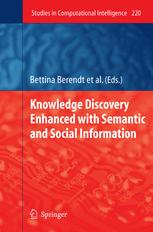

Most ebook files are in PDF format, so you can easily read them using various software such as Foxit Reader or directly on the Google Chrome browser.
Some ebook files are released by publishers in other formats such as .awz, .mobi, .epub, .fb2, etc. You may need to install specific software to read these formats on mobile/PC, such as Calibre.
Please read the tutorial at this link: https://ebookbell.com/faq
We offer FREE conversion to the popular formats you request; however, this may take some time. Therefore, right after payment, please email us, and we will try to provide the service as quickly as possible.
For some exceptional file formats or broken links (if any), please refrain from opening any disputes. Instead, email us first, and we will try to assist within a maximum of 6 hours.
EbookBell Team

4.7
96 reviewsThis book is a showcase of recent advances in knowledge discovery enhanced with semantic and social information. It includes eight contributed chapters that grew out of two joint workshops at ECML/PKDD 2007.
There is general agreement that the effectiveness of Machine Learning and Knowledge Discovery output strongly depends not only on the quality of source data and the sophistication of learning algorithms, but also on additional input provided by domain experts. There is less agreement on whether, when and how such input can and should be formalized as explicit prior knowledge.
The six chapters in the first part of the book aim to investigate this aspect by addressing four different topics: inductive logic programming; the role of human users; investigations of fully automated methods for integrating background knowledge; the use of background knowledge for Web mining. The two chapters in the second part are motivated by the Web 2.0 (r)evolution and the increasingly strong role of user-generated content. The contributions emphasize the vision of the Web as a social medium for content and knowledge sharing.